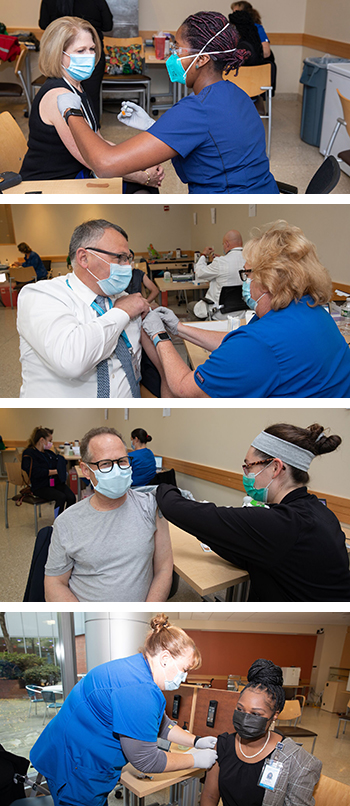-
Services
Featured Specialties
-
Locations
Location Type
-
Patients & Visitors
For more than a year, news reports have focused primarily on COVID-19. But healthcare professionals want people to remember another virus: seasonal influenza, which can be deadly, but is preventable.
The exact timing and duration of flu seasons can vary, but activity often begins increasing in October and peaks between December and February. Flu season can last as late as May.
“We usually say that flu is predictably unpredictable,” said Richard Martinello, MD, YNHHS medical director, Infection Prevention.
Influenza sickens approximately 8 percent of the U.S. population each season, with an average of 12,000 to 61,000 people dying from it each year.
Last year, the U.S. experienced a relatively mild flu season, in part because people were wearing masks, maintaining physical distance, and generally staying home to prevent the spread of COVID-19. These safety measures likely also helped prevent flu viruses from spreading, Dr. Martinello said.
“We did anticipate seeing a reduction in flu due to the measures taken to prevent COVID-19, but it was remarkable to see so little influenza last year,” he said.
Now, more than 64 percent of the U.S. population has received at least one dose of a COVID-19 vaccine. Masking and physical distancing, while still recommended, are much less common. People are gathering; many students have returned to in-person instruction; and the opportunities for influenza exposure are returning to pre-COVID levels.
“This year, we may experience a more typical influenza season, so we need people to be attentive. Flu is still a major public health threat and poses a risk to everyone, including healthy children, teens, adults and pregnant individuals,” said Dr. Martinello. “We’ve already started to see an increase in respiratory viruses now, including respiratory syncytial virus (RSV), which is unusual during the summer months.”
Dr. Martinello recommends these safety measures for this fall and winter:
Encourage loved ones to get a flu vaccine. It’s safe, and recommended for everyone 6 months or older, including those who are pregnant, unless you have a severe allergy to the flu shot. All YNHHS employees and physicians, including those working remotely, must receive a flu vaccination or have an approved medical or religious exemption as a condition of continued employment. Visit the employee intranet for information on scheduling your flu shot. It takes about two weeks to build immunity to the flu after vaccination.
Continue to practice physical distancing and wearing masks. “COVID-19 and influenza viruses both spread through respiratory droplets,” Dr. Martinello said. “The strategies people can employ to minimize the spread of influenza are very similar to the practices used to control the spread of COVID-19.”
Wash your hands. Frequently and thoroughly washing hands with soap and water eliminates or greatly reduces the likelihood of transmitting viruses.
Stay home if you feel sick. People who feel unwell or who have symptoms of influenza such as fever, body aches, sore throat or coughs should stay away from others to avoid transmission.
Get tested if you are sick. Because flu and COVID-19 share some similar symptoms, people might need a test to determine which virus is causing their illness. People can be infected with the flu and COVID-19 viruses at the same time.
